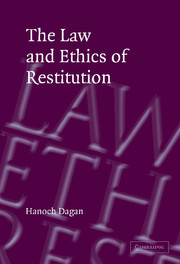Book contents
- Frontmatter
- Contents
- Acknowledgments
- Table of cases
- Table of statutes and treaties
- 1 Introduction
- 2 Preventing unjust enrichment
- 3 Mistakes
- 4 Other-regarding conferrals of benefits
- 5 Self-interested conferrals of benefits
- 6 Restitution in contexts of informal intimacy
- 7 Wrongful enrichments
- 8 Restitution in a contractual context
- 9 Restitution in bankruptcy
- 10 Reasons for restitution
- Bibliography
- Index
5 - Self-interested conferrals of benefits
Published online by Cambridge University Press: 05 July 2009
- Frontmatter
- Contents
- Acknowledgments
- Table of cases
- Table of statutes and treaties
- 1 Introduction
- 2 Preventing unjust enrichment
- 3 Mistakes
- 4 Other-regarding conferrals of benefits
- 5 Self-interested conferrals of benefits
- 6 Restitution in contexts of informal intimacy
- 7 Wrongful enrichments
- 8 Restitution in a contractual context
- 9 Restitution in bankruptcy
- 10 Reasons for restitution
- Bibliography
- Index
Summary
Shifting gear from good samaritans to restitution claimants who conferred a benefit in the pursuit of their own self-interest raises a theoretical puzzle. On the face of it, these claimants – think, for example, of a class action member who pays her lawyer's fee, a mortgagee who pays its mortgagor's taxes in order to prevent foreclosure, or one of several tortfeasors who settles with the victim – can raise none of the reasons for restitution used in either chapter 3 or chapter 4. Their will has not been vitiated; on the contrary, they typically act with some deliberation and intent. They are not (necessarily) do-gooders: in fact, as the title of this chapter indicates, their claim is characterized as deriving from actions that are aimed at being self-serving. And while they can generally show that they have conferred a benefit on the defendant, the defendant can typically invoke the strongest defense – according to both law and theory – of restitution defendants in the good samaritan setting: in some cases she actively indicated her unwillingness to pay for the benefit; in many others, she could at least have been asked (no emergency made communication impracticable). Why should such restitution claimants ever be allowed – even encouraged – to “officiously meddle” (as the common epithet goes) in the defendant's affairs? And why is it that such self-interested claimants actually fare relatively well in the common law of restitution (at least as compared to their other-regarding counterparts)?
- Type
- Chapter
- Information
- The Law and Ethics of Restitution , pp. 123 - 163Publisher: Cambridge University PressPrint publication year: 2004

